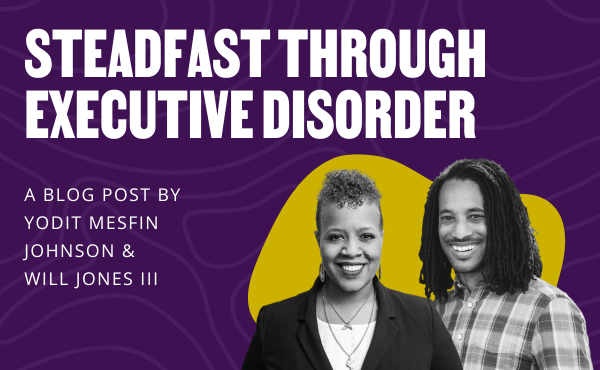Friends,
A couple weeks ago, while a beautiful collection of our beloved community gathered at a NEW for our Stay Woke event, a series of actions took place that are nothing short of a calculated assault on the values of equity, justice, and liberation that we hold dear. As the second Trump administration began its tenure, the contrast between the legacy of Reverend Dr. Martin Luther King Jr. and the policies being enacted could not be more stark. With the swift signing of executive orders, decades—and in some cases centuries—of hard-fought progress towards justice are being undermined, and the most marginalized among us are under attack.
In just a matter of days, we have seen:
- Immigrant communities targeted and dehumanized.
- Federal workers in Diversity, Equity, and Inclusion (DEI) roles placed on leave with plans for mass dismissals.
- Refugees turned away, denying safety to those seeking refuge through established processes.
- Pardons for insurrectionists, emboldening anti-democratic forces.
- Sweeping reversals of environmental protections, civil rights, and workplace equity measures.
- Invalidation of the gender realities and experiences of queer and trans Americans.
It’s a lot to take in. It feels heavy, and it is heavy. But as leaders, as partners, and as advocates for a just society, we cannot afford to disengage. We must stay grounded in our work and committed to the long fight ahead. Let’s break down what these executive orders mean and how they might impact our communities.
What is an Executive Order?
An executive order is a directive from the President that manages operations of the federal government. While it doesn’t carry the weight of legislation and doesn’t require congressional approval, it has the power to dramatically reshape federal priorities and policies. Only a sitting President can overturn an executive order, often by issuing another in its place.
The E.O.s and Their Impact
- Diversity and Civil Rights
- Ending DEI Programs in Federal Government: All DEI initiatives within federal agencies are being dismantled, and employees in these roles face termination. This sends a chilling signal to private sector organizations that protections for marginalized communities are no longer valued.
- Erasing Workplace Discrimination Protections: A decades-old order strengthening workplace protections for federal employees and contractors has been rescinded. This not only impacts government workers, but could also embolden private companies to follow suit.
- Restoring the Death Penalty: The federal death penalty is back, a move disproportionately affecting Black and Brown communities while reversing progress made in dismantling systems of state violence.
- Immigration
- Reinterpreting the 14th Amendment: The administration’s attack on birthright citizenship is a direct challenge to the Constitution and a dangerous escalation of nativist rhetoric.
- Reinstating Travel Bans: Policies targeting individuals from predominantly Muslim and African nations are back, reinforcing the systemic racism embedded in our immigration system.
- Environment and Health
- Rolling Back Climate Protections: Federal support for clean energy and electric vehicles has been stripped away, jeopardizing environmental progress and global climate commitments. Trump has also exited the Paris Agreement.
- Withdrawing from the World Health Organization: Amid ongoing global health challenges, this action is an abdication of responsibility on the world stage.
- Loyalty and Retaliation
- Through a slew of orders, the administration is doubling down on consolidating power and punishing dissent. Plans to reshape the federal workforce with ideological loyalists aim to undermine democratic governance as we know it.
Resource Alert: The National Council of Nonprofits also prepared this Summary of how EOs could directly affect nonprofit organizations.
Lessons from Timothy Snyder’s, On Tyranny
In moments like these, we must draw on the wisdom of scholars, like Timothy Snyder, who reminds us that democracy is not self-sustaining. It requires vigilance, action, and courage. Here are some key principles to guide us:
- Defend Institutions: Support organizations and systems that uphold justice and equity. Nonprofits like ours are critical pillars of resistance and resilience.
- Be Wary of One-Party States: Stay informed and challenge attempts to consolidate power at the expense of democratic principles. Write to your legislators and to companies whose decisions go against your values.
- Believe in Truth: Misinformation is a tool of authoritarianism. Commit to sharing and defending factual information in your work and personal networks.
- Make Eye Contact and Small Talk: Build community and foster connections. Solidarity is our strength, and strong networks can resist oppression.
- Don’t Comply: Democracy depends on active citizenship. Engage in civic actions and encourage others to do the same.
Honoring Black Freedom Fighters During Black History Month
As we reflect on the challenges before us, February—Black History Month—reminds us of the powerful legacy of Black freedom fighters who have paved the way for justice and liberation. Their courage in the face of systemic oppression teaches us invaluable lessons for this moment:
- Resistance in Action: The legacies of leaders, like Harriet Tubman and Frederick Douglass, remind us that freedom is achieved through bold, relentless resistance. Our advocacy for equity and justice must mirror their tenacity.
- Speaking Truth to Power: From Sojourner Truth to Ida B. Wells, Black voices have always been at the forefront of challenging unjust systems. Let us amplify marginalized voices and ensure their perspectives guide our work.
- Community as Power: The efforts of organizers, like Ella Baker and Fannie Lou Hamer, show us the strength in collective action. Let’s build networks of solidarity to sustain our communities through these turbulent times.
- Belief in a Just Future: Despite seemingly insurmountable odds, Black freedom fighters believed in the possibility of a better world. Their resilience ought to inspire us to hold onto hope and push for transformative change.
Staying Grounded
This moment calls for resolve and resilience. As nonprofit leaders and funders, our work is more critical than ever. Here’s how we can stay engaged:
- Advocate Loudly: Speak up for the communities most impacted by these policies. Use your platform to educate and organize.
- Invest in Those Who Are Leading Change: Social justice requires resources: time, talent, and treasure. Make donations to organizations committed to upholding these principles – including intermediaries, like NEW, who help resource grassroots and frontline organizations through training, resources, and space.
- Support Grassroots Movements: Be sure to direct resources to grassroots organizations that are on the frontlines of justice work.
- Take Care of Ourselves and Each Other: Burnout is real, and the work ahead is long. Build in time for rest, reflection, and re-centering.
When you get weary –and we will–remember this: We are the descendants of resistance and the architects of liberation. We will not allow injustice to derail our commitment to equity and justice.
Together, we can build a future that honors our collective humanity. Stay engaged. Stay bold. Stay grounded.
P.S. Follow and listen to our podcast Centering Justice. All season long we’re talking about Deep Democracy. The discussions are rich and the lessons plentiful. Hope to see you there on Feb 19 (02/19/25) at 12PM. Register today!
In solidarity,
Yodit & Will



